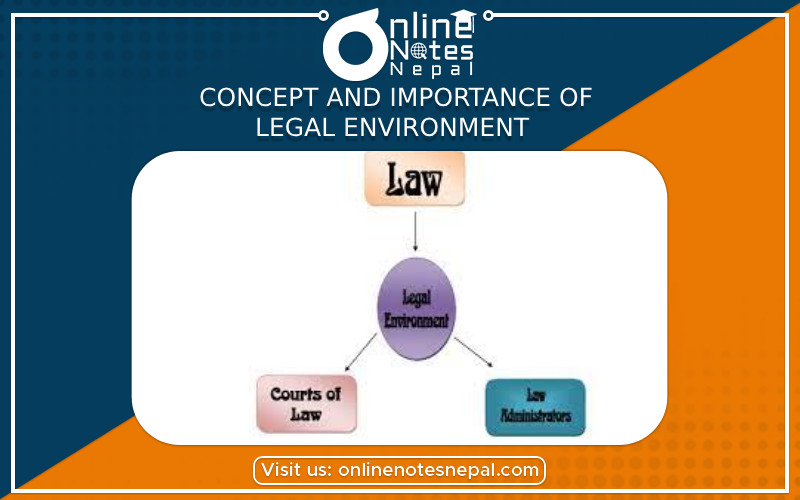Published by: Anu Poudeli
Published date: 02 Aug 2023

The legal environment is the set of rules, regulations, and judicial systems that govern a society and impact the conduct of its citizens, corporations, and organizations. It has a significant impact on how firms run and engage with their stakeholders. Understanding the notion and significance of the legal environment is critical for both individuals and organizations in order to maintain compliance, safeguard their rights, and promote a fair and just society.
Legal Environment Concept:
1.Rules and Regulations: The legal environment is a complex web of rules, regulations, and statutes that govern numerous elements of life, such as company operations, contracts, property rights, employment practices, intellectual property, and so on.
2. Judicial System : The judicial system includes the court system as well as the dispute settlement mechanism. Courts evaluate laws and issue judgements based on legal precedents, ensuring that disagreements and disputes are resolved fairly.
3. Enforcement and Compliance : The legal environment guarantees that laws and regulations are implemented and that compliance is maintained in order to maintain order and protect individuals and companies from harmful behaviors.
4.Social Norms and Values: A society's social norms and values influence the legal environment. It expresses the community's collective ideas and seeks to defend the rights and interests of its members.
5.The legal environment is not static; it evolves throughout time to accommodate changing social, economic, and technological advances.
The Legal Environment's Importance:
1.Rights Protection: The legal environment protects individual rights, property rights, and contractual obligations. This safeguard is critical for instilling trust and confidence in the operations of enterprises and society as a whole.
2.Business Operations: In order to avoid legal ramifications, litigation, and reputational harm, businesses must operate within the legal framework. Understanding and following the legal environment assists firms in navigating difficulties and mitigating risks.
3Dispute Resolution: A strong legal framework provides an organized procedure for resolving disagreements and conflicts. This reduces the need for self-help measures and promotes a peaceful and orderly society.
4.Consumer Protection: Legal restrictions protect customers from fraudulent and unethical commercial practices, assuring the safety and fairness of market goods and services.
5.Contractual Relationships: The legal environment provides the structure and enforcement required for contracts, which serve as the foundation of economic transactions and relationships.
6.Intellectual Property Rights: Intellectual property rules safeguard individuals' and organizations' creations and innovations, fostering future innovation and creativity.
7.Economic Growth and Investment: A stable and predictable legal framework draws both domestic and foreign investments, resulting in economic growth and progress.
8.Social Justice: The legal environment can be used to promote social justice by combatting discrimination, fostering equality, and ensuring equitable access to justice for all members of society.
To summarize, the legal environment is a critical component of any society that affects individuals, corporations, and organizations. It creates the ground principles, protects rights, and contributes to the general stability, growth, and fairness of society and the economy. Understanding and respecting the legal environment is critical for any community's cohesion and prosperity.